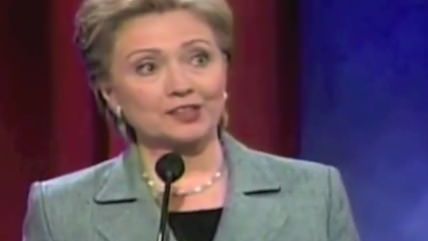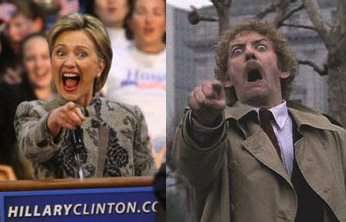Friday A/V Club: What the Gun Debate Looked Like in 2008
A lot can change in seven years.


Since the Democratic nomination wasn't seriously contested in 2012—I'm afraid John Wolfe and Keith Judd don't count—Tuesday night's Demopalooza was the party's first presidential debate in seven years. Seven years is a long time in politics, especially in an age when pundits sometimes struggle to remember what happened more than a month ago. It may not be far enough back to qualify as an entirely different era, but it still feels faintly alien, the way your neighbors do when they look and sound almost the same as usual but have been replaced by extraterrestrial pods.
Take the matter of guns. At this week's debate, almost all the contenders were eager to stress their anti-NRA credentials. Even Bernie Sanders, a moderate on the issue, rushed to reassure viewers that he favored new controls. Only Jim Webb offered a forthright defense of the idea that Americans need "the right to be able to protect their family"; and Webb, last I checked, was polling less than 1 percent.
In 2008, violent crime was more common than now, but the country's most prominent Democrats were a lot less eager to have that kind of conversation. I've discussed that part of the party's history before, and you should read that article if you want the details. But here's the short version: For a period that began with Al Gore's loss in 2000 and ended with some high-profile shootings in 2012, the anti-gun lobby was practically inert on the national level. In part, that reflected a new wave of Netroots-driven Democrats, such as Howard Dean and Brian Schweitzer, who didn't see a contradiction between defending gun rights and pushing the party leftward on economics or foreign policy. And in part it reflected the fact that many pols who did support substantial new gun controls also believed it was a losing cause and that they were better off putting their energy elsewhere.
And so the two leading candidates in 2008—Hillary Clinton and Barack Obama—mostly avoided the topic. The closest it came to affecting the race was when the press discovered Obama's behind-closed-door comments about "bitter" Americans who "cling to guns." Clinton responded by framing herself as a defender of gun owners and claiming to have gone shooting with her dad as a little girl. But this was culture-war stuff, not a public-policy battle. When people asked Clinton about gun control on the campaign trail, she would praise her husband's anti-gun legislation; as best as I can tell, the only firearms policy where she reversed her stand that year was when she backed down from her support for a national gun registry.
So when ABC's Charlie Gibson asked the candidates about guns at a debate in Philadelphia, his opening question was, basically, You two have a history of supporting gun control. Why aren't you bringing that up when you campaign?
Things to note:
1. Both candidates said they supported the Second Amendment, supported crime control, and wanted to strike an appropriate balance between the two. That was the formula of the hour.
2. This was two months before the Supreme Court handed down its decision in D.C. v. Heller, the landmark case that affirmed that the Second Amendment protected an individual right. Anyone interested in gun policy was keeping an eye on the case. When Gibson asked about it, both Clinton and Obama refrained from taking a stand on D.C.'s gun ban.
3. At one point, Clinton said it made sense for rural states to have lighter firearm restrictions than urban areas. That's the very argument that a lot of Clintonites have been damning Bernie Sanders for using this time around.
4. Did you notice these comments from Clinton?
I will be a good partner for cities like Philadelphia as president, because I will bring back the COPS program, the so-called COPS program, where we had 100,000 police on the streets, which really helped drive down the crime rate and also helped create better community relations.
I will also work to reinstate the assault weapons ban. We had it during the 1990s. It really was an aid to our police officers, who are now, once again, because it has lapsed and the Republicans will not reinstate it, are being outgunned on our streets by these military-style weapons.
Criminal justice reformers often complain about the COPS program today. While it was designed to fund neighborly "community policing" policies, it also helped fuel a lot of darker changes, such as the explosion in the number of "school resource officers"—that is, police officers based in schools. (When activists decry the criminalization of student discipline and throw around phrases like "the school-to-prison pipeline," those school cops are one of their leading complaints.) Some COPS funds even found their way to SWAT teams.
Today both "gun control" and "criminal justice reform" are popular phrases with the Democratic base, so it may sound a little jarring for Hillary Clinton to move so easily from praising the COPS program to praising the assault weapons ban. But both were a part of the 1994 crime bill. Bill Clinton's restrictions on guns were embedded in a larger law 'n' order push, as such measures often are.
One last note about that alien landscape we call 2008: Remember Jim Webb? The gun-rights guy at Tuesday's debate? Before he declared that he wasn't interested in the job, he was widely cited as a potential running mate for Obama. The Palin/Webb debates would've been interesting, that's for sure.
Bonus link: "What the Gun Debate Looked Like in 1967."
(For past editions of the Friday A/V Club, go here.)
